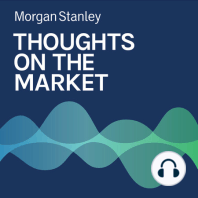3 min listen
An Early Guide to the 2024 U.S. Elections
ratings:
Length:
6 minutes
Released:
Dec 6, 2023
Format:
Podcast episode
Description
Although much will change before the elections, investors should watch for potential impacts on issues such as AI regulation, energy permitting, trade and tax policy.----- Transcript -----Michael Zezas: Welcome to Thoughts on the Market. I'm Michael Zezas, Morgan Stanley's Global Head of Fixed Income and Thematic Research. Ariana Salvatore: And I'm Ariana Salvatore, from the U.S. Public Policy Research Team. Michael Zezas: On this special episode of Thoughts on the Market, we'll discuss our early views around the 2024 U.S. presidential election. It's Wednesday, December 6th at 10 a.m. in New York. Michael Zezas: With U.S. elections less than a year away now, it's likely much will change in terms of the drivers of the outcome and its market impact. Still, we believe early preparation will help investors navigate the campaign. And so starting now, we'll bring your updated views and forecasts until the U.S. elects its next president in November of 2024. Arianna, we've noted that this upcoming election will affect particular sectors rather than the broader macro market. What's driving this view? Ariana Salvatore: There are really two reasons that we've been pointing to. First, lawmakers have achieved a lot of their policy priorities that impact the deficit over the past few election cycles. If you think about the 2017 Tax Cuts and Jobs Act or the infrastructure bill back in 2021, for example. Now they're turning to policy that holds more sectoral impacts than macro. The second reason is that inflation is still a very high priority issue for voters. As we've noted, an elevated level of concern around inflation really disincentivizes politicians from pushing for legislation that could expand the deficit because it's seen as contrary to that mandate of fiscal austerity that comes in a high inflation environment. There is one exception to this. As we've noted before, lawmakers will have to deal with the expiring Tax Cuts and Jobs Act. We think the different configurations post 2024 each produce a unique outcome, but we expect in any scenario, that will only add modestly to the deficit. Michael Zezas: And digging into specific sectors. What policies are you watching and which sectors should investors keep an eye out for in the event these policies pass? Ariana Salvatore: Following the election, we think Congress will turn to legislative items like AI regulation, energy permitting, trade and tax policy. Obviously, each unique election outcome will facilitate its own level and type of policy transformation. But we think you could possibly see the biggest divergence from the status quo in a Republican sweep. In particular, in that case, we'd expect lawmakers to launch an effort to roll back, at least partially, the Inflation Reduction Act or the IRA, though we ultimately don't think a full scale repeal will be likely. We also expect to see something on AI regulation based on what's currently in party consensus, easing energy permitting requirements and probably extending the bulk of the expiring Tax Cuts and Jobs Act. That means sectors to watch out for would be clean tech, AI exposed stocks and sectors most sensitive to tax changes like tech and health care. Mike, as we mentioned, with this focus on legislation that impacts certain sectors, we don't expect this to be a macro election. So is there anything that would shift the balance toward greater macro concerns? Michael Zezas: Well, if it looks like a recession is getting more likely as the election gets close, it's going to be natural for investors to start thinking about whether or not the election outcome might catalyze a fiscal response to economic weakness. And in that situation, you'd expect that outcomes where one party doesn't control both Congress and the White House would lead to smaller and somewhat delayed responses. Whereas an outcome where one party controls both the White House and Congress, you would probably get a bigger fiscal response that comes faster. Those are two
Released:
Dec 6, 2023
Format:
Podcast episode
Titles in the series (100)
Andrew Sheets: For Markets, Signs, Signs, Everywhere Signs by Thoughts on the Market
